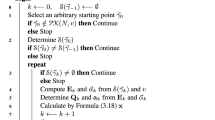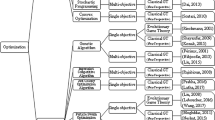Abstract
This paper is aimed at widening the scope of applications of majorized correspondences. A new class of majorized correspondences—domain \({\mathcal {U}}\)-majorized correspondences—is introduced. For them, a maximal element existence theorem is established. Then, sufficient conditions for the existence of an equilibrium in qualitative games are provided. They are used to show the existence of a pure strategy Nash equilibrium in compact quasiconcave games that are either correspondence secure or correspondence transfer continuous.
Similar content being viewed by others
Notes
See also Carmona (2009) where a class of games with upper hemicontinuous best-reply correspondences is studied.
The notion of a correspondence transfer continuous game, introduced in this paper, is an improvement on the notion of a generalized weakly transfer continuous game, due to Nessah (2011).
For more details, see Reny (2013, Theorem 3.4).
References
Aliprantis, C.D., Border, K.C.: Infinite Dimensional Analysis: A Hitchhiker’s Guide, 3rd edn. Springer, Berlin (2006)
Barelli, P., Meneghel, I.: A note on the equilibrium existence problem in discontinuous games. Econometrica 81, 813–824 (2013)
Baye, M.R., Tian, G., Zhou, J.: Characterization of the existence of equilibria in games with discontinuous and non-quasiconcave payoffs. Rev. Econ. Stud. 60, 935–948 (1993)
Bich, P.: Existence of pure Nash equilibria in discontinuous and non quasiconcave games. Int. J. Game Theory 38, 395–410 (2009)
Borglin, A., Keiding, H.: Existence of equilibrium actions and of equilibrium: a note on the ‘new’ existence theorems. J. Math. Econ. 3, 313–316 (1976)
Carbonell-Nicolau, O., Ok, E.A.: Voting over income taxation. J. Econ. Theory 134, 249–286 (2007)
Carmona, G.: An existence result for discontinuous games. J. Econ. Theory 144, 1333–1340 (2009)
Carmona, G.: Understanding some recent existence results for discontinuous games. Econ. Theory 48, 31–45 (2011)
Carmona, G.: Reducible equilibrium properties: comments on recent existence results. Econ. Theory (2014). doi:10.1007/s00199-014-0842-y
De Castro, L.I.: Equilibria existence in regular discontinuous games. Econ. Theory 48, 67–85 (2011)
Ding, X.P.: Equilibria of noncompact generalized games with \({\cal {U}}\)-majorized preference correspondences. Appl. Math. Lett. 11, 115–119 (1998)
Ding, X.P., Tan, K.K.: On equilibria of non-compact generalized games. J. Math. Anal. Appl. 177, 226–238 (1993)
Ding, X.P., Yuan, X.Z.: The study of existence of equilibria for generalized games without lower semicontinuity in locally topological vector spaces. J. Math. Anal. Appl. 227, 420–438 (1998)
Duggan, J.: Equilibrium existence for zero-sum games and spatial models of elections. Games Econ. Behav. 60, 52–74 (2007)
Fan, K.: Fixed-point and minimax theorems in locally convex topological spaces. Proc. Natl. Acad. Sci. USA 38, 121–126 (1952)
He, W., Yannelis, N.C.: Equilibria with discontinuous preferences. University of Iowa, mimeo (2014)
McLennan, A., Monteiro, P.K., Tourky, R.: Games with discontinuous payoffs: a strengthening of Reny’s existence theorem. Econometrica 79, 1643–1664 (2011)
Monteiro, P.K., Page, F.H.: Uniform payoff security and Nash equilibrium in compact games. J. Econ. Theory 134, 566–575 (2007)
Nessah, R.: Generalized weak transfer continuity and the Nash equilibrium. J. Math. Econ. 47, 659–662 (2011)
Prokopovych, P.: On equilibrium existence in payoff secure games. Econ. Theory 48, 5–16 (2011)
Prokopovych, P.: The single deviation property in games with discontinuous payoffs. Econ. Theory 53, 383–402 (2013)
Prokopovych, P., Yannelis, N.C.: On the existence of mixed strategy Nash equilibria. J. Math. Econ. 52, 87–97 (2014)
Reny, P.J.: On the existence of pure and mixed strategy Nash equilibria in discontinuous games. Econometrica 67, 1029–1056 (1999)
Reny, P.J.: Strategic approximation of discontinuous games. Econ. Theory 48, 17–29 (2011)
Reny, P.J.: Nash equilibrium in discontinuous games. University of Chicago, mimeo (2013)
Scalzo, V.: Essential equilibria of discontinuous games. Econ. Theory 54, 27–44 (2013)
Tan, K.K., Yuan, X.Z.: Equilibria of generalized games with \({\cal {U}}\)-majorized preference correspondences. Econ. Lett. 41, 379–383 (1993)
Tian, G.: Generalizations of the FKKM theorem and the Ky Fan minimax Inequality, with applications to maximal elements, price equilibrium, and complementarity. J. Math. Anal. Appl. 170, 457–471 (1992)
Urai, K.: Fixed Points and Economic Equilibria. World Scientific, Singapore (2010)
Yannelis, N.C., Prabhakar, N.D.: Existence of maximal elements and equilibria in linear topological spaces. J. Math. Econ. 12, 233–245 (1983)
Yannelis, N.C.: The core of an economy without ordered preferences. In: Khan, M.A., Yannelis, N.C. (eds.) Equilibrium Theory in Infinite Dimensional Spaces. Springer, Berlin (1991)
Yuan, X.Z.: The study of equilibria for abstract economies in topological vector spaces—a unified approach. Nonlinear Anal. 37, 409–430 (1999)
Yuan, X.Z., Tarafdar, E.: Existence of equilibria of generalized games without compactness and paracompactness. Nonlinear Anal. 26, 893–902 (1996)
Yuan, X.Z., Tarafdar, E.: Maximal elements and equilibria of generalized games for \({\cal {U}}\)-majorized and condensing correspondences. Int. J. Math. Math. Sci. 22, 495–504 (1999)
Author information
Authors and Affiliations
Corresponding author
Additional information
I am grateful to Nicholas Yannelis for very helpful discussions and commentary.
Appendix
Appendix
1.1 Proof of Lemma 2
Suppose that \(F\) is locally \({\mathcal {U}}_{\theta }\)-majorized. We have to show that it is \({\mathcal {U}}_{\theta }\)-majorized. For every \(x\in X\), there exists an open neighborhood \(U(x)\) and a \({\mathcal {U}}_{\theta }\)-majorant \( F^{x}:U(x)\rightarrow Y\) of \(F\) at \(x\) such that \(F(z)\subset F^{x}(z)\) and \( \theta (z)\notin F^{x}(z)\) for every \(z\in U(x)\). The open cover \( \{U(x):x\in X\}\) has a finite subcover \(\{U(x^{j}):j=1,\ldots ,J\}\). For each \(j\), define \(F_{j}^{\prime }:X\rightarrow Y\) by
Since each \(F_{j}^{\prime }\) is upper hemicontinuous on \(X\) and \(Y\) is a compact subset of a Hausdorff topological vector space, the correspondence \( \overline{F}:X\twoheadrightarrow \) \(Y\) defined by \(\overline{F}(z)=\cap _{j\in \{1,\ldots ,J\}}F_{j}^{\prime }(z)\) for every \(z\in X\) is of class \( {\mathcal {U}}_{\theta }\) (see, e.g., Aliprantis and Border 2006, Theorem 17.25). Clearly, \(F(z)\subset \overline{F}(z)\) for every \(z\in U(x)\).
1.2 Proof of Theorem 2
Assume, by contradiction, that \(\varGamma \) has no equilibrium, i.e., \(\mathrm { Dom}\varGamma =X\). Since \(X\) is compact, the open cover \(\{U(x):x\in X\}\) of \(X\) contains a finite subcover \(\{U(x^{j}):j\in J\}\), where \(J\) is a finite set. Let \(\{V_{j}:j\in J\}\) be an open refinement of \(\{U(x^{j}):j\in J\}\) such that cl\(V_{j}\subset U(x^{j})\) for every \(j\in J\) (see, e.g., Urai 2010, Theorem 3.1.3). For each \(j\in J\) and each \(i\in I\), define a correspondence \(\widehat{F}_{i}^{j}:X\twoheadrightarrow X_{i}\) by

We need to show that each \(\widehat{F}_{i}^{j}\) is upper hemicontinuous on \( X \). Fix some \(i\in I\), \(j\in J\), and \(z\in X\). Assume that there exists a relatively open, proper subset of \(X_{i}\), \(W\), such that \(\widehat{F} _{i}^{j}(z)\subset W\). Clearly, \(i\in I(x^{j})\) and \(z\in V_{j}\). Denote \( J_{C}^{z}=\{s\in J:z\in \mathrm {cl}V_{s}\}\). Since, for each \(s\in J_{C}^{z}\) , \(D_{i}^{x^{s}}\) is either nonempty-valued and upper hemicontinuous at \(z\) or empty-valued at \(z\), there exists a neighborhood \(U_{s}\) of \(z\) such that \(U_{s}\subset V_{j}\cap U(x^{s})\) and \(D_{i}^{x^{s}}(U_{s})\subset W\). Then \( \widehat{F}_{i}^{j}(\cap _{s\in J_{C}^{z}}U_{s}\cap (\cap _{s\in J\backslash J_{C}^{z}}(X\backslash \mathrm {cl}V_{s})))\subset W\).
For \(i\in I\) and \(j\in J\), define \(F_{i}^{j}:X\twoheadrightarrow Y\) by \( F_{i}^{j}(z)=\mathrm {co}\widehat{F}_{i}^{j}(z)\) for every \(z\in X\). Then \( F_{i}^{j}\) is compact-valued (see, e.g., Aliprantis and Border 2006, Lemma 5.29), and, moreover, \(F_{i}^{j}\) is upper hemicontinuous on \(X_{i}\) (see, e.g., Aliprantis and Border 2006, Theorem 17.35). Then, for each \(i\in I\), the correspondence \(F_{i}:X\twoheadrightarrow X_{i}\) defined by \( F_{i}(z)=\cap _{j\in J}F_{i}^{j}(z)\) for every \(z\in X\) is upper hemicontinuous on \(X\). Therefore, the correspondence \(\overline{F} :X\twoheadrightarrow X\) defined by \(\overline{F}(z)=\Pi _{i\in I}F_{i}(z)\) is upper hemicontinuous on \(X\).
Consider some \(z\in X\). It lies in some \(V_{j}\). Let us show that \( z_{i^{\prime }}\notin F_{i^{\prime }}^{j}(z)\) for some \(i^{\prime }\in I(x^{j})\). By (ii), there exists \(i^{\prime }\in \cup _{s\in J_{C}^{z}}I(x^{s})\) such that \(z_{i^{\prime }}\notin \mathrm {co}\{\cup _{s\in J_{C}^{z}}D_{i^{\prime }}^{x^{s}}(z)\}\). Since \(\widehat{F} _{i^{\prime }}^{j}(z)=\cup _{s\in J_{C}^{z}}D_{i^{\prime }}^{x^{s}}(z)\), we have that \(z_{i^{\prime }}\notin F_{i^{\prime }}^{j}(z)\). Therefore, \( z_{i^{\prime }}\notin F_{i^{\prime }}(z)\), and, consequently, \(z\notin \overline{F}(z)\).
Since \(\overline{F}\) is of class \({\mathcal {U}}\) and \(\mathrm {Dom}\varGamma = \mathrm {Dom}\overline{F}=X\), \(\varGamma \) is \({\mathcal {U}}^{d}\)-majorized. Then it has an equilibrium by Lemma 5, a contradiction.
Rights and permissions
About this article
Cite this article
Prokopovych, P. Majorized correspondences and equilibrium existence in discontinuous games. Econ Theory 61, 541–552 (2016). https://doi.org/10.1007/s00199-015-0874-y
Received:
Accepted:
Published:
Issue Date:
DOI: https://doi.org/10.1007/s00199-015-0874-y
Keywords
- Majorized correspondence
- Qualitative game
- Better-reply secure game
- Correspondence secure game
- Transfer continuous game




